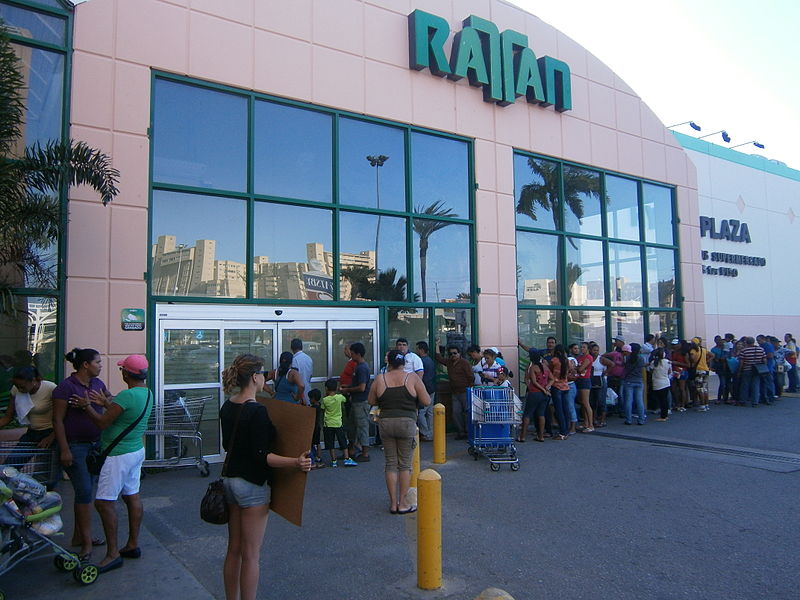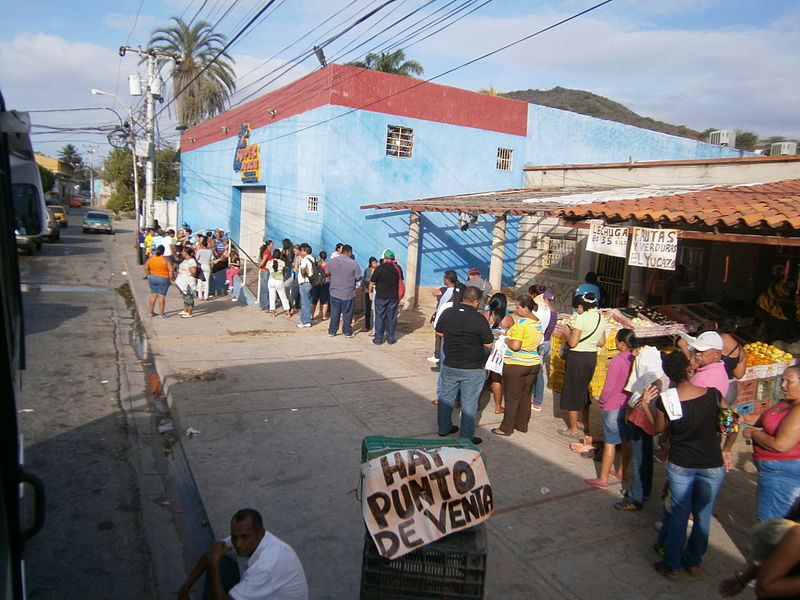EspañolIn Venezuela, it’s not just food that is scarce. The dramatic decline in domestic production has led to an incremental paralysis of everyday life.
Even according to the Central Bank of Venezuela, official scarcity closed at 29.4 percent in March, although there are products for which the rate ranged between 90 and 100 percent, such as corn oil and coffee.
On Thursday, the cheese industry warned that it had run out of packaging to distribute their products. That same day, the Venezuelan Chamber of Packaging (CAVENVASE) publicized that the glass and aluminum industries have ceased production and are unable to provide bottles and cans to package basic foods. The president of CAVENVASE explained that the government owes them US$230 million for import purchases. El Nacional has revealed that the chemical industry is in a similar situation, the government owing them $682 million.
The lack of parts, chemicals, and other raw materials has severely affected the commercial and industrial medical industry, but the government considers other conspiratorial reasons, such as hoarding and speculation by those in the production chain, to be the source of problems in the economy.
The government also claims that “economic war” waged by external forces aims to sow chaos in their country as a way to discredit and eventually oust President Nicolás Maduro.
An Unhealthy Economy
The President of the Venezuelan Medical Federation (FMV), Douglas León Natera, reported recently that 95 percent of hospitals in the country have only 5 percent of supplies needed to operate normally. Patients are advised to go directly to the pharmacy or an importing company to purchase any medical equipment they may need, raising doubts regarding Venezuela’s free health care system.
Protesta por falta de insumos #HUC médicos y residentes #UCV pic.twitter.com/4TH3fGHmPd
— Mariano Fernández S (@mferna) February 17, 2014
However, a trip to the pharmacy and having the money to pay for the expense does not guarantee health care. The Pharmaceutical Federation of Venezuela reports a shortage of 50% in the supply of medicines. “Even 15 percent would be enough to be alarmed,” said Freddy Ceballos, president of the federation, during a radio interview.
The AFP news agency reports that the government now owes approximately $4 billion to importers of drugs, equipment, and medical and surgical supplies. Ceballos refers to the government’s inability to ensure the production and acquisition of all necessary materials in the production chain as the “intermittent market.” When there is no shortage drugs, for example, there may be a lack of aluminum packaging or ink to print boxes, labels, and brochures with medical instructions. According to Cabellos, this situation has caused a high rate of inactivity in the 148 laboratories that operate nationwide.
This week nine children — four, five, and six years old and hospitalized at the J.M. De los Ríos Hospital in Caracas — came close to losing their lives due to a lack of dialysis catheters and lines needed for their hemodialysis sessions. The doctor in charge of their case said the company that supplies the equipment did not have it in stock and the Venezuelan Institute of Social Security did not respond to requests made by the hospital.
Cancer patients also find themselves in a similarly dramatic situation. This week, the Venezuelan Society of Public Health and the Epidemiology Defense Network released a statement regarding the disappearance of 16 of the 26 required medicines to treat cancer, as well as supplies to care for those afflicted with the disease.
Although it is possible to pay for treatment, this also remains a challenge in Venezuela. The Clinical Hospital of Caracas (HCC), one of the most prestigious and modern private centers in the country, is equipped with CT-PET systems that can help diagnose cancers. However, the lack of radioactive iodines to operate the equipment has rendered the machines inactive for over a year.
In March, Physicians for Health reported that since October of 2013, the shortage of materials such as catheters and probes required for cardiological operations has caused the deaths of 235 people. This continues despite the fact that heart problems are the leading cause of death in Venezuela, according to the Ministry of Health.
Commercial Cardiac Arrest

The magnitude of the Venezuelan economic crisis is also visible in the country’s shopping centers. Elevators are out of service, escalators shut off, and restroom facilities are usually closed.
One merchant in a small shopping center in downtown Caracas, who preferred to remain anonymous, claims he is not able to get rolls of paper for the cash register in his shop. Currently, he relies on donations from a neighboring shop owner who was able to buy enough while it was still available.
The escalators in the mall have been shut off for almost a year. The shortage of spare parts and the high cost involved with acquiring them has made it impossible to repair even the most basic mechanical failure.
At the Tamanaco City Commercial Center (CCCT), one of the oldest malls in Caracas, the management appears to have taken certain precautions. Most of the time, escalators will only work going down, but not up. Not because they are damaged, but because management leaves them off on purpose to “save on electricity use,” according to a member of the maintenance staff.
This is also why CCCT stores will close at 7:00 pm, several hours earlier than they used to close before the shortage crisis began. Customers are forced to promptly leave the premises, and many complain they do not have enough time to shop.
These management decisions were made after the government ordered a reduction in rental charges on November 29, 2013. According to the Venezuelan Chamber of Commercial Centers, Merchants, and Associates (CAVECECO), this caused revenue for management offices to drop by 80 percent.
The order states that owners cannot charge tenants more than 250 Bs. per square meter per month ($3 at the black-market rate). This has made it so that a small venue of about 12 square meters, that before cost 17,000 Bs., now only costs 3,000 bolivars ($41).
However, the order to reduce rent did not impact retail prices, and in practice local owners continue to charge the old rate unofficially — collecting either in cash or without billing their tenant. The tenants continue to pay the old rate under the tacit understanding that the rates imposed by the government are unsustainable and do not represent a minimally reasonable compensation for the owners.
If the situation continues, malls could begin to close for several days out of the week and operate only part time.
A Country Holding On

Despite being the country with the world’s largest oil reserves, Venezuela continues to produce fewer goods and services of high value.
Victor Maldonado, executive director of the Chamber of Commerce, Industry, and Services of Caracas, says that out of the 11,000 manufacturing companies that existed in Venezuela 15 years ago, fewer than 5,000 have survived today. He emphasizes that industries that have been completely nationalized, such as cement, aluminum, and iron, have practically ceased production, and the products that are derived from these materials have disappeared from the market.
For Maldonado, the situation is not surprising, considering that business conditions in Venezuela were ranked 181st out of 189 countries in the world, according to the latest Doing Business report by the World Bank. According to the director, one of the policies that most affects the market is the high level of taxes and payroll fees that make up 61.7 percent of company profits, well above the regional average of 47.3 percent and the average of OECD countries of 41.3 percent.
As a result of the enactment of the Law of Fair Prices, pressure on private enterprise has also increased. The law creates criminal penalties of two to 14 years in prison for things such as hoarding or speculation, which government spokesmen say is the cause of the Venezuelan economic crisis. Last weekend, for example, 22 merchants were detained on charges of this nature.
In January, shortly before the enactment of the new law, President Nicolás Maduro created the Superintendent of Costs, Earnings, and Fair Prices, which is tasked with monitoring the entire economic chain to regulate profits and decrease the economic impact felt by Venezuelans.
On Friday, the government initiated the Special Plan of the New Economic Offensive, an idea developed by the president to better focus on the economic problems within the country. Maduro sent “plenipotentiary economic leaders” to five different regions of the country to focus on the areas of production, supply, and fair prices.
A Government That Tries to Do Everything
Maldonado believes that the economic problems of the country are a result of a lack of a “systemic” view of the state. After the destruction of production capacity, on the back of 15 years of interventionist policies, central economic planning, especially with regard to the foreign exchange market, has become even more difficult.
“Because of the bureaucratic management of foreign currency, many different players have to be involved and reach an agreement to import certain materials at a given time, but when they finally do, something else is then lacking.” Maldonado concludes that “the system of production requires that dozens of components come together within the framework of the market, but when the market is militantly controlled, as in Venezuela, the economy becomes paralyzed and is about to come to a complete stop.”
 Versión Español
Versión Español












